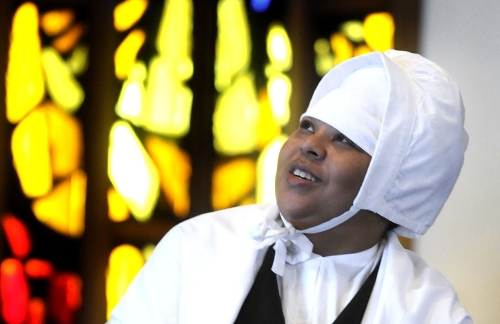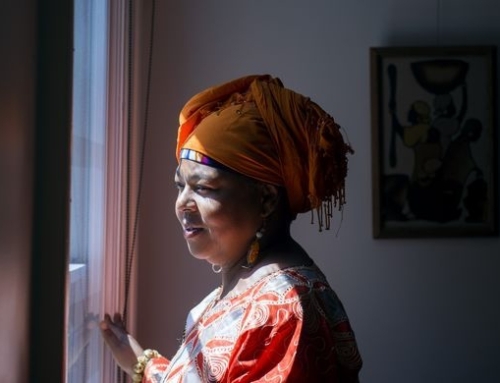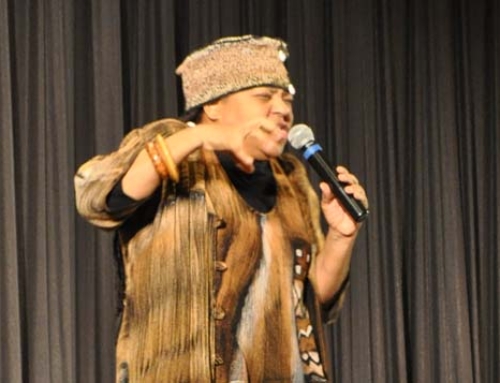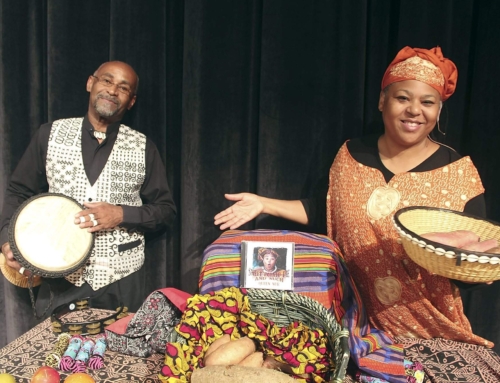By GARY DEMUTH Salina Journal
Storyteller Queen Nur is concerned that many American children learn just two things about African-American history in school: slavery and civil rights.
“There’s not too much about what happened in between,” she said.
That’s why the New Jersey-based storyteller decided to write and perform a theatrical piece about black women who helped shape American history by fighting not only for African-American rights, but
for women’s rights as well.
Nur performed her original piece “Voices of Courage” Saturday at Quayle United Methodist Church, 725 Commanche, as part of this weekend’s Martin Luther King Jr. Day celebration.
Nur also did history-based presentations last week in Salina at Stewart, Sunset and Oakdale Elementary Schools and at Lakewood Middle School.
She has performed at the Kennedy Center in Washington, D.C., on Broadway and at storytelling festivals throughout the U.S. She also teaches storytelling at Rutgers Camden’s Artist/Teacher Institute in New Jersey.
Nur has performed in Salina on previous occasions, most notably at the Smoky Hill River Festival.
Studying in D.C.
To prepare “Voices of Courage,” Nur said she spent a great deal of time in the Library of Congress in Washington, D.C., researching prominent black women of history.
Her piece begins with Sojourner Truth, the self-coined name of abolitionist and women’s rights activist Isabella Baumfree, born in 1797.
“She traveled giving lectures in the states of the union for women’s rights,” Nur said.
Although Truth could not read or write, Nur said, she delivered a famous speech, “Ain’t I a Woman?” at the Ohio Women’s Rights Convention in Akron, Ohio, in 1851. She also was credited with writing a song for the 1st Michigan Colored Regiment during the Civil War titled “The Valiant Soldiers,” sung to the tune of “Battle Hymn of the Republic.”
Other women brought to life by Nur during her hourlong presentation included:
Frances Ellen Watkins Harper (born in 1825) was considered the “mother” of
African-American journalism and was the first black woman to publish a novel.
Ida B. Wells, born in 1862, was a journalist and newspaper editor who documented the proliferation of lynchings in the U.S. and
was active in the women’s suffrage movement. Long before Rosa Parks refused to give up her seat on a bus, Wells refused to give up her seat on a train to a white man. She sued the railroad company and won, Nur said.
Mary Church Terrell, born in 1863, was one of the first black women to earn a college degree. She, too, was an activist who helped work for civil rights and women’s suffrage, Nur said. She later became famous for her 1940 autobiography, “A Colored Woman in a White World.”
Mary McLeod Bethune, Born 1875, was an educator who started a school for black students in Daytona, Fla., which later became Bethune-Cookman University. She also was an advisor to President Franklin D. Roosevelt.
Once, Nur said, Bethune was confronted at her school by members of the Klu Klux Klan. She told them, “If you must burn my school, burn it, and I will build it again and again and
again.” The hooded men went away.
The common thread in all these women, Nur said, was their strength, faith and willingness to fight for justice in an often unjust world.
Salinan Vickie Wilcher said she was inspired by Nur’s performance and the women she brought to life.
“(Nur) is truly the best storyteller I’ve
ever seen,” Wilcher said. “I was drawn
into the performance and the women and the hardships they endured.”
Nur said it’s been an inspiration to bring these pioneer women to life.
“It’s American history, and I’m honored and humbled to tell their stories,” she said. ask alice website host information “Even though we’ve made great strides
today, there’s still a lot to do. I think they’d
still be fighting for justice and equality today.”
Reporter Gary Demuth can be reached at 822-1405 or by e-mail at gdemuth@salina.com.













Leave A Comment